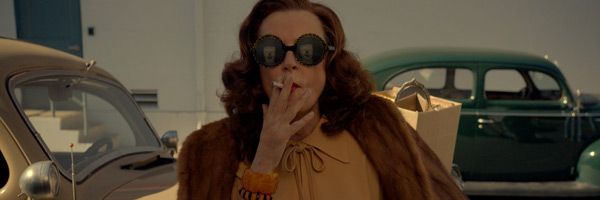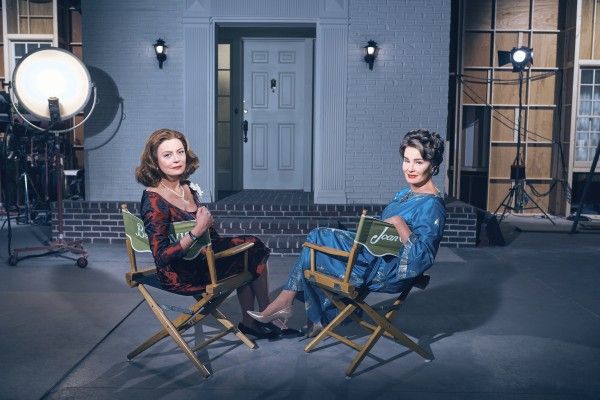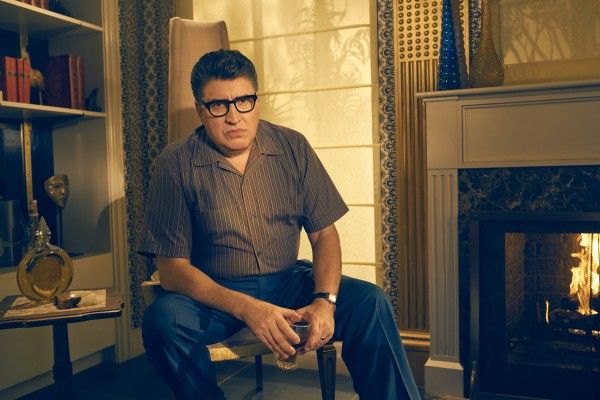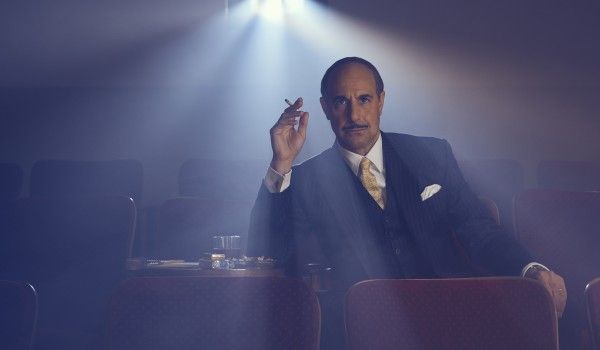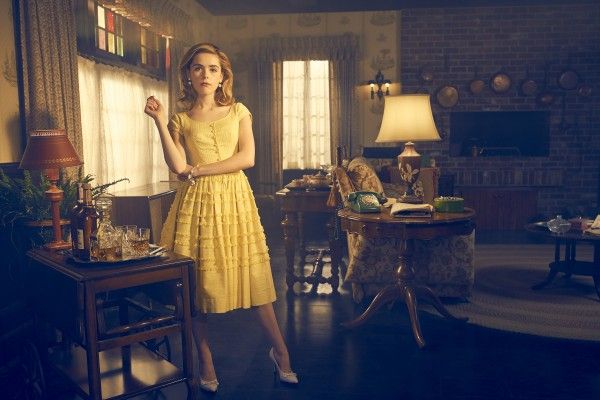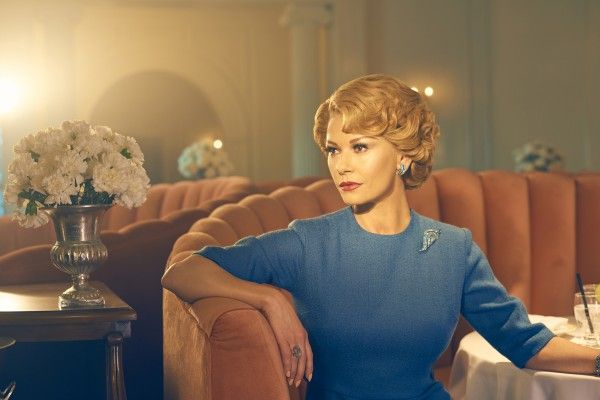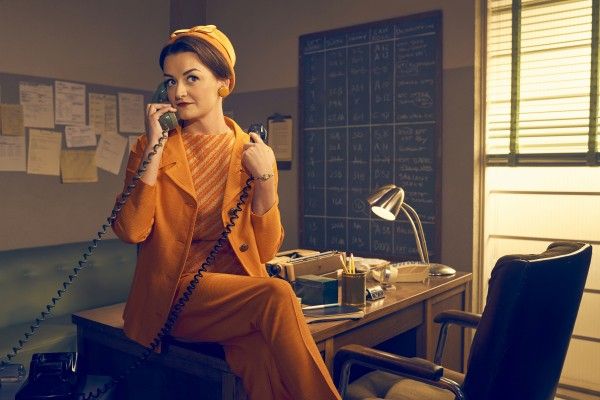The first installment of the new FX anthology series from Ryan Murphy, Feud: Bette and Joan tells the story of the legendary rivalry between actresses Joan Crawford (Jessica Lange) and Bette Davis (Susan Sarandon) during their collaboration on What Ever Happened to Baby Jane? Through the lens of ageism, sexism and misogyny, the two women tried to hang on to success and fame in their careers, as long as they possibly could, even if it mean directly attacking or sabotaging each other. The series also stars Alfred Molina, Stanley Tucci, Judy Davis, Jackie Hoffman and Alison Wright, with appearances by Catherine Zeta-Jones, Sarah Paulson, Kathy Bates and Kiernan Shipka.
During this 1-on-1 interview with Collider, executive producer Dede Gardner talked about the highly ambitious project, the breathtaking performances by Jessica Lange and Susan Sarandon, never doubting that the two women would be able to pull this off, how this series evolved from a feature film, the trickiness in casting well-known actors to play well-known actors, why Ryan Murphy is one of her favorite storytellers, and the biggest production challenges with this show. She also talked about the reaction to the Netflix series The OA, for which she was an executive producer, and not being hands-on for the TV series adaptation of The Departed.
Collider: This is a very ambitious project. What’s it like to see how it’s all been pulled off?
DEDE GARDNER: It was really fun! It helps that Ryan [Murphy] is at the helm. I think he’s earned the right to do something this ambitious. He’s got a group of people who have worked with him forever. I’ve worked with him forever. Obviously, he’s known Jessica [Lange]. There was a lot of familial populus. It was good!
As a producer, what’s it like to see such a great marriage of actor and material?
GARDNER: It’s really breathtaking! We’ve had Susan [Sarandon] and Jessica in our minds as these two people, for a long, long time. They bring a humanism and a fragility, which I think has very much to do with who they are, as women. It’s that thing you wish for. You do your best, you have the scripts as good as you can get them, you have great directors and a great cast, and everything looks right, but there’s still that one little thing. I think they grabbed that, in a really profound way.
Did you just know that Jessica Lange and Susan Sarandon would find a way to pull off playing Joan Crawford and Bette Davis, or was there a moment that reassured you?
GARDNER: I don’t think we doubted it. You know they’re some of the greatest actors alive, and you know they do an insane amount of research. They’ve seen everything and read everything. We felt pretty sure.
When this whole crazy concept came your way, what was your initial reaction to Ryan Murphy wanting to do this?
GARDNER: It was a screenplay for a movie first, maybe seven years ago. Ryan and I knew there was something in it, but it existed on a much more superficial level. The movie kept being very elusive. We were like, “Who’s gonna pay for it? How much is it gonna cost? What is this movie’s reason to be? Does it really have a reason to be? Why are we making this?” I’ve done this long enough to know that that means something, and that something is not right. And then, Ryan called me to say, “You know what? We need to do eight hours.” And I was like, “Oh, that’s, of course, right!” If given the time, it can be about misogyny, ageism, what the contract system really did, women being taught to be brutal to one another, as the only mechanism by which they’re gonna succeed, and all of the other stuff. It instantly became obvious.
It seems like there would have just been way too much material to do as a feature film.
GARDNER: I know! I can’t even fathom that it actually once was a screenplay. It was just a trifle. It would have been very superficial and literally flown away.
What do you respond to in Ryan Murphy, as a storyteller and filmmaker?
GARDNER: He’s one of my favorites on Earth. I’ve worked with him for forever. I think he’s insanely brave, and this is a hard town to be brave in. It’s hard to do it because people can be critical, and it’s also hard to do it because most people will say no. It’s hard internally, and it’s hard externally. I think that, if you look back on his body of work and what he has done to put out into the world a diverse range of characters and human beings, I don’t know anyone else who’s done that. And he doesn’t rest on his laurels. He keeps pushing. He’s one of my best friends, but as an artist, I deeply admire him.
Did you always see that in him, even in the beginning?
GARDNER: Yeah, I did!
Obviously, he has a lot of freedom in his work now, but was that a fight, initially?
GARDNER: It was a huge fight! When we tried to get Running with Scissors made, it was a huge fight. But you find like-minded souls, as you make your way through this career. I always felt very at home with him and very interested in fighting battles for him.
Is there a trickiness to casting such well-known actors to play well-known actors?
GARDNER: It can be, yeah. You’ve gotta just get the right people. What you don’t want are imitations. You want someone attempting to re-express the same essence, but not just do a reflection or rendering.
As you started seeing what everyone was doing with their roles, who most surprised you?
GARDNER: I don’t know if I was surprised because I figured everyone would be amazing, but Stanley Tucci is so good as Jack Warner that it’s mind-blowing. He’s such a jerk of a character, and Stanley is so lovely as a man, that that was a little bit like, “Oh, wow!” But everyone, honestly, was incredible. Judy Davis is a dream, just to watch her work.
What can viewers expect from the ride they’ll be taking with this series?
GARDNER: I think it’s very emotional. I don’t really want to make something that’s not. I hope it’s delightful and delicious, and really fun to watch and look at, but way beyond that, I hope people are moved. I hope people think about ageism and misogyny, and that it’s lonely when you get older. We are a very youth-driven culture, and I don’t really know why because wisdom tends to come with more years, not fewer.
How do you think the interviews throughout the episodes help with the storytelling?
GARDNER: I think it helps with context. It’s not an era that people know a ton of specificity about. Also, the notion of hearing from other actresses is something we thought would be helpful to bear witness.
What are the biggest production challenges with a show like this?
GARDNER: It’s a puzzle. You’re getting scripts, and you’re in and out of locations, and there’s actor availability. You’re doing one episode on one stage, and one episode on another stage. It’s a little bit mad, actually. There’s not a prayer for chronology.
You also produced The OA for Netflix. What was it like to see how that show built into this big thing that everyone was talking about?
GARDNER: They’re all interesting. You wonder, how is this going to enter the world? How is it going to be received? I love it with all my heart, so I’m thrilled that it was detected. And I think the degree with which people were trying to unpack its mysteries was just so fun to watch and read about.
And you’re developing a TV series for The Departed?
GARDNER: It’s true. Honestly, I’m not very involved in that. We did the movie. Warner Bros. Television came up with the notion and there’s other people on the front line of that. I hope it’s good ‘cause I think the movie is good. It’s a good idea. I can understand why that idea could sustain a television show, so it makes sense.
Feud: Bette and Joan airs on FX on Sunday nights.

